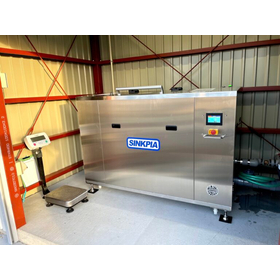[CO2 Reduction × Food Factory] Introduction of Commercial Food Waste Processor by Nagatanien Foods
Commercial food waste disposer Sink Pia GJ-150
Processing large amounts of food waste generated on-site in food manufacturing! Here we introduce examples of the utilization of food waste processing machines introduced to reduce environmental impact and improve operational efficiency.
The commercial food waste processor "Sink Pia" is a machine that biodegrades food waste using the power of microorganisms. Previous commercial food waste processors required the processed material to be removed, but with Sink Pia, food waste is biodegraded in about 24 hours. There is no need to remove it anymore. 【Five Key Points of the Commercial Food Waste Processor 'Sink Pia'】 ■ No need to transport or burn; processes on-site ■ Different processing method from compost types ■ Energy-saving design ■ Compact size ■ Made in Japan with comprehensive support *For more details, please download the catalog or feel free to contact us. We are always accepting requests and consultations for demonstration installations of the equipment.
Inquire About This Product
basic information
For more details, please download the catalog or feel free to contact us.
Price range
Delivery Time
Applications/Examples of results
For more details, please download the catalog or feel free to contact us.
catalog(4)
Download All CatalogsCompany information
"What we want you to discard is the conventional wisdom of food waste disposal machines." The development concept of Sink Pia is to process food waste 'without transporting, without burning, and on-site.' By self-processing food waste within facilities, it contributes to CO2 reduction and the SDGs. Japan's food waste disposal, which has relied heavily on incineration, is at a turning point, and many companies are entering the food waste processing machine industry to meet the needs of the times. However, it is also an industry where many companies have been forced to withdraw due to issues related to research and development costs, as well as a lack of knowledge, experience, and skills. Some have already started demonstration experiments, focusing on the development of microbial houses using biodegradable materials, the development of devices for processing dirty biodegradable containers, and further research on resource recovery such as liquid fertilizers and soil conditioners from decomposed water. We aim to be a company that is needed by more customers and can realize a society that is friendly to the future of the Earth's environment.


![[Comprehensive Catalog] Commercial Food Waste Processor Sink Pia](https://image.mono.ipros.com/public/catalog/image/01/e15/355232/IPROS741825587306973971.jpeg?w=120&h=170)
![[Concept Catalog] Commercial Food Waste Processor Sink Pia](https://image.mono.ipros.com/public/catalog/image/01/9fc/355233/IPROS97919348904398666138.jpeg?w=120&h=170)

![[SINKPIA + SDGs] Commercial Food Waste Processor Sinkpia](https://image.mono.ipros.com/public/catalog/image/01/cd6/665665/IPROS41795439056302394625.jpeg?w=120&h=170)

![[Installation Example] Makomanai Holy Mother Certified Children's Garden](https://image.mono.ipros.com/public/product/image/754/2001523034/IPROS1030471812492014322.jpg?w=280&h=280)
![[Case Study of Food Waste Disposal Machine] Gunma Food Industry Co., Ltd.](https://image.mono.ipros.com/public/product/image/1a4/2001515327/IPROS13505089869008067797.jpg?w=280&h=280)
![[Installation Example] Kyosan Manufacturing Co., Ltd.](https://image.mono.ipros.com/public/product/image/08a/2001518110/IPROS17194486576075414099.jpg?w=280&h=280)
![[Installation Example] Kawanehon Town School Lunch Joint Cooking Facility](https://image.mono.ipros.com/public/product/image/b6f/2001519771/IPROS5515565021412805636.png?w=280&h=280)
![[Case Study of Food Waste Processor Installation] Meikyu Co., Ltd.](https://image.mono.ipros.com/public/product/image/58c/2001515852/IPROS9063163735812023208.png?w=280&h=280)
![[Installation Example] National Public Service Mutual Aid Association Hamanocho Hospital](https://image.mono.ipros.com/public/product/image/681/2001521758/IPROS10751981511543812859.jpg?w=280&h=280)